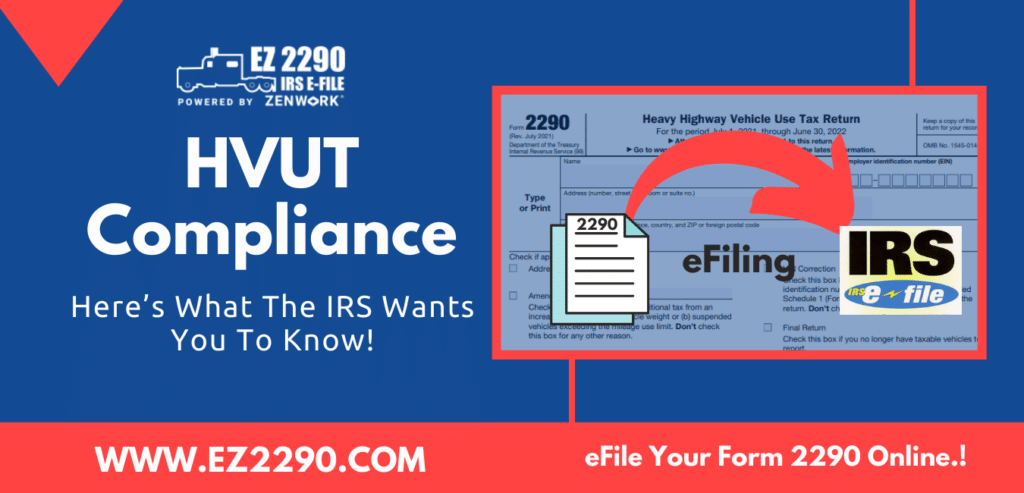Here are a few recommendations made by the IRS to help taxpayers with truck tax compliance.

Businesses are preparing their 2290 truck tax returns as the 2290 deadline is fast approaching. The IRS has officially issued a statement on the 2290 due date, which aims to provide some important clarity for new and old truck taxpayers. The statement is focused on regulatory reporting, tax compliance, and business compliance.
The following will discuss the IRS recommendations and advice extracted from the statement and other latest newsroom updates to help small truck businesses and fleet owners with their truck tax reporting.
Not sure if you need to file/pay your HVUT taxes? You can take this interactive interview from the IRS to determine if you need to pay and file HVUT tax for your trucks.
These essential compliance practices will help businesses with preparing, filing, and managing their IRS filings and communications.
Furnish The Most Accurate Vehicle Information
Self-employed truckers, fleet owners, trucking businesses, owner-operator trucking businesses, and other registered trucking businesses are all responsible for furnishing the most accurate vehicle, tax, and business information in the 2290 tax returns in good faith. The reported information is used to assess the business compliance status and cross-checks other compliance review protocols.
If the information reported is inaccurate or not in alignment with the reporting requirements, the returns will be rejected for inconsistencies and non-compliance.
It is also important to note that hiding the real information of your business/vehicles is treated as tax evasion and the IRS is free to assess monetary and civil penalties on such individuals/entities and conduct unannounced audits.
To avoid such extreme situations, the IRS advises trucking businesses to follow the 2290 filing instructions and get help from the IRS online assistance resources.
You can also get tax assistance from EZ2290’s support team here at no additional cost.
Review Your Truck Tax Reports
The IRS encourages taxpayers to thoroughly review and validate the information reported before submitting the returns to the IRS. Internal audit processes will help fasten the file acceptance and streamline the verification processes, allowing you to complete your tax obligations quickly.
Multi-level reviews mean multiple checks on the reported information. These internal reviews help you examine the information reported and validate it in accordance with the necessary documentation or records, improving your reporting accuracy.
TIN/EIN verification, VIN Lookup, and vehicle category verifications cannot be missed when reporting heavy vehicle tax information in the federal tax form, 2290.
Verify Your IRS-Authorized E-File Provider
e-Filing methods are recommended by the IRS when a taxpayer has to submit more than 25 forms to the IRS.
If you are e-filing, it is important to ensure that you are filing with platforms or companies that are actually authorized by the IRS.
Check if your truck tax e-file provider is registered with the IRS here and here.
By following this quick step, you will be able to verify your e-file provider and file your returns with them confidently.
You will be able to find EZ2290 listed as an authorized agent of the IRS here.
IRS 2290 Deadline Is NOT Related To Vehicle Registration Date
The latest statement released by the IRS is alerting the taxpayers on the correlation between the registration date of the vehicle and the IRS deadline. It is essential to note that the date of registration of the vehicle will not change the 2290 filing due date.
Further, if businesses are reporting newly registered vehicles, then businesses have to specify the date on which the vehicle was first used on the highways.
Here’s a quick table to help you understand the due date logic for 2290 HVUT forms.
| If the vehicle is first used during | eFile 2290 and pay tax by | Enter this date on Form 2290, Line 1* |
| July | August 31 | YYYY07 |
| August | September 30 | YYYY08 |
| September | October 31 | YYYY09 |
| October | November 30 | YYYY10 |
| November | December 31 | YYYY11 |
| December | January 31 | YYYY12 |
| January | Last day of February | YYYY01 |
| February | March 31 | YYYY02 |
| March | April 30 | YYYY03 |
| April | May 31 | YYYY04 |
| May | June 30 | YYYY05 |
| June | July 31 | YYYY06 |
Expect Delays In Paper File Processes & Expedite Requests For Copies of Schedule 1
If you’re e-Filing, you can probably ignore this step.
If you are paper filing, you need to know that the IRS is short on staff for manual reviews due to the current pandemic situation. The paper files will be processed at a slower pace. However, the IRS assures taxpayers that all files, paper and electronic, will be reviewed as fast as possible.
Paper filers need not submit duplicated returns if they did not receive a response from the IRS. Taxpayers can request copies of schedule 1 per these instructions from the IRS. Expect slight delays for expedite requests as well.
For accelerated 2290 processing, the IRS recommends electronic filing.
FAQS For Truckers From The IRS
Note: When you eFile with EZ2290, you receive a digital copy of the IRS-stamped stamped Schedule 1 instantly.
Related Ez2290 Blogs
- 5 Smart Tips For 2290 Filings: 2290 Due Dates, HVUT Compliance & More
- HVUT E-File: What Are The Penalties For Late Filing Of HVUT Form 2290
- Taxable Gross Weight Of The Vehicle Increased? Here’s How To Report It On IRS Form 2290
- HVUT Compliance: How To Re-File Rejected Returns?
- VIN Corrections: 3 Smart Tips For Reporting Correct VINs On Your 2290 Returns






